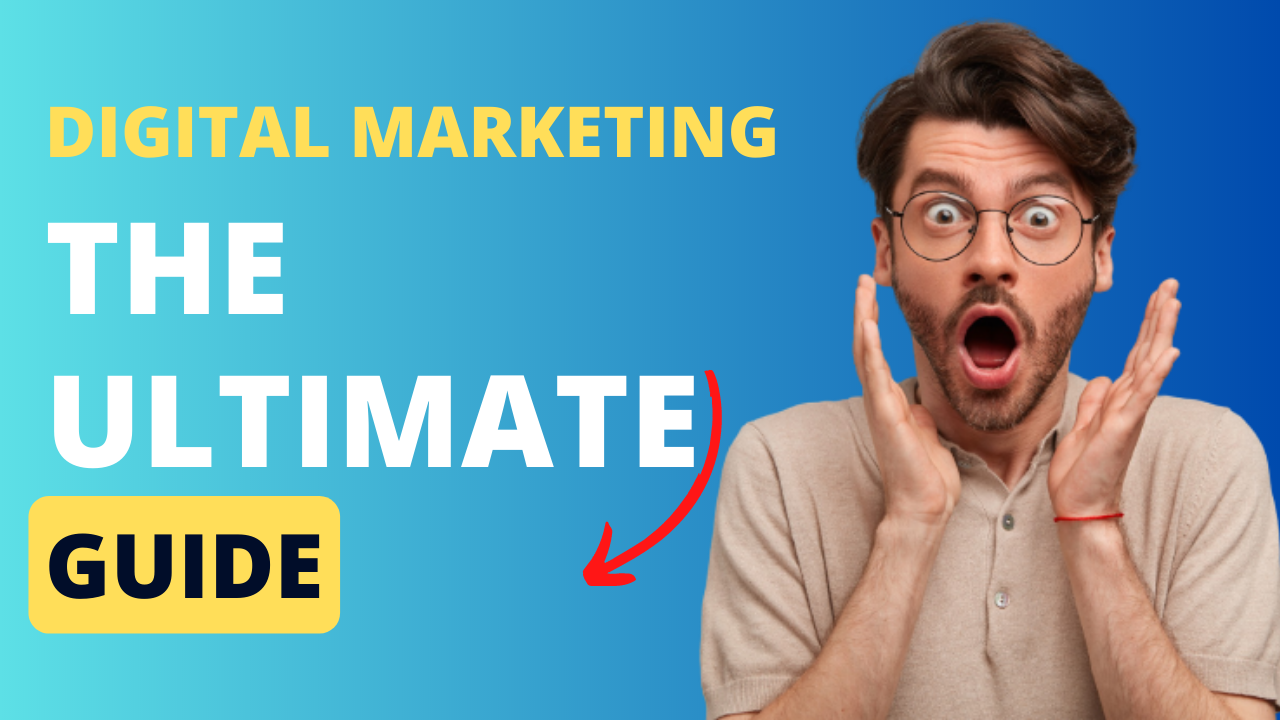Digital marketing has become an essential strategy for businesses in today’s fast-paced, technology-driven world. With the ever-growing influence of the internet, businesses need to establish a strong online presence to reach their target audience effectively. In this comprehensive guide, we will delve into the world of digital marketing and provide you with the insights you need to create a successful online marketing strategy.
Outline of the article
- Introduction to Digital Marketing
- Understanding the Importance of Digital Marketing
- Key Components of Digital Marketing
- 3.1 Search Engine Optimization (SEO)
- 3.2 Pay-Per-Click (PPC) Advertising
- 3.3 Social Media Marketing
- 3.4 Email Marketing
- 3.5 Content Marketing
- 3.6 Influencer Marketing
- 3.7 Affiliate Marketing
- Developing a Digital Marketing Strategy
- 4.1 Identifying Target Audience
- 4.2 Setting Clear Goals and Objectives
- 4.3 Choosing the Right Digital Marketing Channels
- 4.4 Creating Compelling Content
- 4.5 Implementing Effective SEO Strategies
- 4.6 Measuring and Analyzing Results
- Effective Use of Social Media Platforms
- 5.1 Facebook Marketing
- 5.2 Instagram Marketing
- 5.3 Twitter Marketing
- 5.4 LinkedIn Marketing
- Maximizing Results with Email Marketing
- 6.1 Building an Email List
- 6.2 Crafting Engaging Email Campaigns
- 6.3 Personalization and Segmentation
- 6.4 Analyzing Email Marketing Metrics
- Creating Valuable Content
- 7.1 Understanding Content Marketing
- 7.2 Developing a Content Strategy
- 7.3 Types of Content
- 7.4 Optimizing Content for SEO
- 7.5 Promoting and Distributing Content
- Implementing SEO Strategies
- 8.1 Keyword Research and Analysis
- 8.2 On-Page Optimization
- 8.3 Off-Page Optimization
- 8.4 Technical SEO
- 8.5 Local SEO
- The Power of Data Analytics in Digital Marketing
- 9.1 Collecting and Analyzing Data
- 9.2 Tools and Technologies for Data Analytics
- 9.3 Making Data-Driven Decisions
- Staying Up-to-Date with Digital Marketing Trends
- 10.1 Voice Search and AI Assistants
- 10.2 Video Marketing
- 10.3 Mobile Marketing
- 10.4 Influencer Marketing
- Conclusion
- FAQs
- 12.1 What is the role of SEO in digital marketing?
- 12.2 How can social media benefit a business in digital marketing?
- 12.3 What are the key elements of an effective email marketing campaign?
- 12.4 How important is content marketing in the digital marketing landscape?
- 12.5 Why is data analytics crucial for digital marketing success?
Introduction to Digital Marketing
Digital marketing has completely revolutionized the marketing landscape, replacing traditional print and television advertisements with a dynamic and data-driven approach. In today’s digital age, businesses leverage various online channels, platforms, and strategies to connect with their target customers, boost brand awareness, and drive sales. This comprehensive guide will delve into the world of digital marketing, exploring its key components and revealing how businesses can harness its power to achieve their marketing goals.
Digital marketing offers unparalleled opportunities for businesses to reach their target audience with precision. Through advanced targeting options, businesses can tailor their marketing messages to specific demographics and customer segments. This level of personalization ensures that marketing efforts are focused on individuals who are most likely to be interested in their products or services. By harnessing the power of digital marketing, businesses can maximize their return on investment and optimize their marketing campaigns for better results.
One of the key advantages of digital marketing is the ability to track and measure the effectiveness of marketing campaigns in real time. Through web analytics and data tracking tools, businesses can gain valuable insights into customer behavior, engagement rates, and conversion metrics. This data-driven approach enables businesses to make informed decisions, refine their strategies, and allocate their marketing budgets more effectively. By leveraging the power of data and analytics, businesses can continually optimize their digital marketing efforts to drive better outcomes.
In conclusion, digital marketing has fundamentally transformed the way businesses approach marketing in the digital age. By embracing the diverse components of digital marketing, businesses can connect with their target customers, foster brand loyalty, and drive sustainable growth. In the following sections, we will explore the intricacies of each digital marketing component and provide practical insights on how to leverage them effectively.
Understanding the Importance of Digital Marketing

In today’s highly competitive business landscape, understanding the importance of digital marketing is crucial for sustained success. Digital marketing provides businesses with a wide range of advantages over traditional marketing methods. By embracing digital strategies, businesses can expand their reach, target specific demographics, track and measure campaign performance, and deliver personalized marketing messages tailored to their audience’s needs and preferences. This section will delve deeper into the significance of digital marketing and how it can propel businesses towards achieving their goals.
One of the key benefits of digital marketing is its ability to reach a wider audience. With the increasing number of internet users worldwide, businesses can tap into a vast pool of potential customers through various digital channels. By optimizing their online presence and utilizing techniques such as search engine optimization (SEO) and social media marketing, businesses can enhance their visibility and attract a larger audience to their products or services. The broad reach of digital marketing enables businesses to connect with customers globally, breaking down geographical barriers and opening up new opportunities for growth.
Targeting specific demographics is another crucial aspect of digital marketing. With the wealth of data available, businesses can identify their ideal customer profiles and tailor their marketing efforts accordingly. Digital marketing allows for precise targeting based on factors such as age, location, interests, and behavior. By directing their resources towards these specific segments, businesses can optimize their marketing campaigns, increase relevance, and improve engagement rates. This targeted approach ensures that businesses reach the right people with the right message, ultimately driving higher conversion rates and return on investment.
Key Components of Digital Marketing

To succeed in digital marketing, it’s crucial to understand the key components that make up this multifaceted strategy. Let’s explore some of the most important components:
1. Search Engine Optimization (SEO)
SEO plays a vital role in improving a website’s visibility on search engine results pages. By optimizing your website’s content, structure, and technical aspects, you can rank higher in search engine listings, attract organic traffic, and increase your online visibility.
2. Pay-Per-Click (PPC) Advertising
PPC advertising allows businesses to display ads on search engines and other online platforms. Advertisers pay a fee when users click on their ads, making it a cost-effective way to drive targeted traffic to their websites and generate leads.
3. Social Media Marketing
Social media marketing involves using social media platforms to engage with and attract an audience. By creating compelling content and building a strong social media presence, businesses can connect with their customers, promote their products or services, and drive traffic to their websites.
4. Email Marketing
Email marketing enables businesses to reach their target audience directly through personalized email campaigns. By delivering relevant and valuable content to subscribers’ inboxes, businesses can nurture leads, build customer loyalty, and drive conversions.
5. Content Marketing
Content marketing focuses on creating and distributing valuable content to attract and engage a target audience. By providing informative and relevant content, businesses can establish thought leadership, build trust with their audience, and drive organic traffic to their websites.
6. Influencer Marketing
Influencer marketing involves collaborating with influential individuals in a particular niche to promote products or services. By leveraging the reach and credibility of influencers, businesses can expand their brand reach, gain access to new audiences, and drive conversions.
7. Affiliate Marketing
Affiliate marketing is a performance-based marketing strategy where businesses reward affiliates for driving website traffic or sales. By partnering with affiliates, businesses can tap into their networks and leverage their promotional efforts to boost sales and brand awareness.
Developing a Digital Marketing Strategy
To achieve optimal results in digital marketing, it’s essential to develop a well-defined strategy. Here are the key steps involved in creating an effective digital marketing strategy:
1. Identifying Target Audience
Understanding your target audience is crucial for crafting tailored marketing messages and selecting the right channels. Conduct market research, analyze customer demographics, and create buyer personas to define your target audience effectively.
2. Setting Clear Goals and Objectives
Identify specific, measurable, achievable, relevant, and time-bound (SMART) goals for your digital marketing efforts. Whether it’s increasing website traffic, improving conversion rates, or boosting brand awareness, clear goals will guide your strategy.
3. Choosing the Right Digital Marketing Channels
Based on your target audience and goals, select the most appropriate digital marketing channels. Consider factors such as reach, engagement potential, and cost-effectiveness when deciding which channels to prioritize.
4. Creating Compelling Content
Content is the backbone of any successful digital marketing campaign. Develop high-quality, engaging content that resonates with your target audience and aligns with your brand values.
5. Implementing Effective SEO Strategies
Optimize your website and content using SEO best practices to improve your organic search rankings. Conduct keyword research, optimize meta tags, create valuable backlinks, and improve site speed to increase your visibility in search engine results.
6. Measuring and Analyzing Results
Regularly monitor and analyze key performance indicators (KPIs) to assess the effectiveness of your digital marketing efforts. Use analytics tools to track website traffic, conversion rates, email open rates, social media engagement, and other relevant metrics.
Effective Use of Social Media Platforms
Social media platforms offer immense opportunities for businesses to connect with their target audience. Here’s how you can maximize your results on popular social media platforms:
1. Facebook Marketing
Create a business page on Facebook and engage with your audience through informative posts, eye-catching visuals, and interactive features. Utilize Facebook ads to expand your reach and drive targeted traffic to your website.
2. Instagram Marketing
Leverage Instagram’s visual nature to showcase your products or services. Post captivating images, stories, and videos that resonate with your target audience. Use relevant hashtags and collaborate with influencers to reach a wider audience.
3. Twitter Marketing
Harness the power of real-time conversations on Twitter. Share timely updates, engage in discussions, and respond to customer queries. Use hashtags and retweets to increase your visibility and foster brand advocacy.
4. LinkedIn Marketing
Position your brand as an industry leader on LinkedIn. Publish informative articles, join relevant groups, and engage with professionals in your niche. Use LinkedIn advertising to target professionals and decision-makers.
Maximizing Results with Email Marketing
Email marketing remains a highly effective strategy for nurturing leads and driving conversions. Here are some best practices for maximizing your email marketing efforts:
1. Building an Email List
Build an engaged and targeted email list by offering valuable content, incentives, and exclusive offers. Use opt-in forms on your website and leverage social media to encourage sign-ups.
2. Crafting Engaging Email Campaigns
Create personalized and relevant email campaigns that resonate with your subscribers. Segment your email list based on demographics, interests, or purchasing behavior to deliver tailored messages.
3. Personalization and Segmentation
Personalize your email content and subject lines to grab your subscribers’ attention. Leverage segmentation to send targeted emails that address specific needs and preferences.
4. Analyzing Email Marketing Metrics
Track and analyze email marketing metrics such as open rates, click-through rates, and conversion rates. Use this data to refine your email campaigns and optimize their performance.
Creating Valuable Content
Content marketing plays a pivotal role in digital marketing success. Here’s how you can create valuable content that resonates with your audience:
1. Understanding Content Marketing
Understand the core principles of content marketing and how it aligns with your overall digital marketing strategy. Develop a content marketing plan that defines your target audience, content goals, and distribution channels.
2. Developing a Content Strategy
Create a content calendar outlining the topics, formats, and distribution channels for your content. Conduct keyword research to identify relevant topics and optimize your content for search engines.
3. Types of Content
Diversify your content formats to cater to different audience preferences. This can include blog posts, videos, infographics, podcasts, case studies, and more.
4. Optimizing Content for SEO
Incorporate relevant keywords, meta tags, and headers to optimize your content for search engines. Focus on providing valuable information and a great user experience to drive organic traffic.
5. Promoting and Distributing Content
Share your content across various channels, including social media platforms, email newsletters, industry forums, and guest blogging. Encourage social sharing and engagement to expand your content’s reach.
Implementing SEO Strategies
Search engine optimization (SEO) is essential for improving your website’s visibility on search engine results pages. Here are the key strategies for effective SEO:
1. Keyword Research and Analysis
Conduct thorough keyword research to identify relevant and high-volume keywords in your niche. Use keyword research tools and analyze competitor websites to uncover valuable keywords.
2. On-Page Optimization
Optimize your website’s on-page elements, such as titles, meta descriptions, headers, and content, to align with target keywords. Ensure your website is user-friendly, fast-loading, and mobile-responsive.
3. Off-Page Optimization
Build high-quality backlinks from reputable websites to improve your website’s authority and rankings. Leverage guest blogging, influencer collaborations, and social media promotion to earn valuable backlinks.
4. Technical SEO
Optimize your website’s technical aspects, such as crawlability, site structure, XML sitemap, and robots.txt. Ensure proper indexing of your website by search engines.
5. Local SEO
If you have a physical presence, optimize your website for local search by including location-specific keywords, creating a Google My Business profile, and garnering positive reviews.
The Power of Data Analytics in Digital Marketing
Data analytics plays a crucial role in understanding the performance of your digital marketing efforts and making informed decisions. Here’s how you can leverage data analytics effectively:
1. Collecting and Analyzing Data
Implement tracking mechanisms such as Google Analytics to collect data on website traffic, user behavior, conversions, and other relevant metrics. Use data visualization tools to analyze and interpret this data effectively.
2. Tools and Technologies for Data Analytics
Explore various data analytics tools and technologies that can help you gain insights into your digital marketing campaigns. Consider tools for data visualization, customer relationship management (CRM), and marketing automation.
3. Making Data-Driven Decisions
Use data analytics to identify trends, customer preferences, and areas of improvement in your digital marketing strategy. Base your decisions on data insights to optimize your campaigns and maximize your return on investment (ROI).
Staying Up-to-Date with Digital Marketing Trends
The digital marketing landscape is constantly evolving. Stay ahead of the curve by keeping up with the latest trends and innovations. Here are some key trends to watch out for:
1. Voice Search and AI Assistants
With the rise of voice-activated devices and smart assistants, optimizing your content for voice search is becoming increasingly important. Focus on long-tail keywords and natural language in your SEO strategy.
2. Video Marketing
Video content continues to gain popularity across digital platforms. Incorporate video marketing into your strategy through tutorials, product demonstrations, customer testimonials, and live streams.
3. Mobile Marketing
Given the widespread use of mobile devices, ensure that your website and content are mobile-friendly. Consider mobile advertising, location-based targeting, and mobile apps to enhance your mobile marketing efforts.
4. Influencer Marketing
Influencer marketing continues to be a powerful strategy for reaching and engaging with target audiences. Collaborate with influencers who align with your brand values and have a genuine connection with their followers.
read more: Marketing Ebooks: 10 Powerful Resources to Master the Game
Conclusion
In conclusion, the realm of digital marketing presents a constantly evolving landscape brimming with immense opportunities for businesses to connect with their target audience and propel their growth. By comprehending the fundamental components of digital marketing, crafting a strong and adaptable strategy, and remaining abreast of emerging trends, businesses can successfully navigate this dynamic field. Embracing the power of data analytics, curating valuable and engaging content, and harnessing the diverse array of digital marketing channels are pivotal steps toward achieving your business goals in the digital realm.
As businesses venture into the realm of digital marketing, it becomes clear that data analytics is a force to be reckoned with. By leveraging the wealth of data at your disposal, you can gain invaluable insights into the performance of your digital marketing campaigns, customer behavior patterns, and emerging trends. Armed with this knowledge, you can make informed, data-driven decisions, optimize your strategies, and maximize your return on investment. The ability to extract meaningful information from data is a vital skill in the digital marketing landscape and a key driver of success.
Creating valuable and compelling content is the cornerstone of effective digital marketing. In a sea of information, it is crucial to stand out by providing content that resonates with your audience, addresses their pain points, and offers solutions. By offering informative and engaging content, you can establish thought leadership, build trust, and cultivate lasting relationships with your target customers. Whether it’s through blog posts, videos, social media content, or email newsletters, your content should be tailored to captivate and provide value to your audience, ultimately driving engagement and conversions.
FAQs
1. What is the role of SEO in digital marketing?
SEO plays a crucial role in digital marketing by improving a website’s visibility on search engine results pages. It involves optimizing website content, structure, and technical aspects to rank higher in search engine listings, attract organic traffic, and increase online visibility.
2. How can social media benefit a business in digital marketing?
Social media platforms provide businesses with opportunities to connect with their target audience, promote their products or services, and drive website traffic. By creating engaging content, leveraging social media advertising, and engaging with followers, businesses can boost brand awareness and customer engagement.
3. What are the key elements of an effective email marketing campaign?
An effective email marketing campaign involves building an engaged email list, crafting personalized and relevant email content, utilizing segmentation and personalization techniques, and regularly analyzing campaign performance. By nurturing leads and delivering valuable content, businesses can drive conversions and foster customer loyalty.
4. How can businesses maximize the effectiveness of their content marketing?
To maximize the effectiveness of content marketing, businesses should understand their target audience, develop a content strategy, create diverse and valuable content formats, optimize content for SEO, and promote it through various channels. By delivering informative and engaging content, businesses can establish thought leadership, build trust, and drive organic traffic.
5. How important is data analytics in digital marketing?
Data analytics plays a crucial role in understanding the performance of digital marketing campaigns, identifying trends, and making data-driven decisions. By collecting and analyzing data on website traffic, user behavior, conversions, and other relevant metrics, businesses can optimize their digital marketing strategies and maximize their ROI.




